Geta (emperor)
Geta (/ˈɡɛtə/; fully: Publius or Lucius Septimius Geta; 7 March 189 – 26 December 211)[1] was Roman emperor with his father Septimius Severus and older brother Caracalla from 209, when he was named Augustus like his brother, who had held the title since 198. Severus died in 211, and although he intended for his sons to rule together, they proved incapable of sharing power, culminating with the murder of Geta in December of that year.[2]
| Geta | |||||||||
|---|---|---|---|---|---|---|---|---|---|
| Augustus | |||||||||
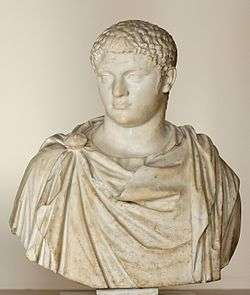 Bust of Geta in the Louvre | |||||||||
| Emperor of the Roman Empire | |||||||||
| Reign | 209 – 26 December 211 | ||||||||
| Predecessor | Septimius Severus | ||||||||
| Successor | Caracalla | ||||||||
| Co-emperors | Septimius Severus (209–211) Caracalla (209–211) | ||||||||
| Born | 7 March 189 Rome | ||||||||
| Died | 26 December 211 (aged 22) | ||||||||
| |||||||||
| Dynasty | Severan | ||||||||
| Father | Septimius Severus | ||||||||
| Mother | Julia Domna | ||||||||
Early life
| Roman imperial dynasties | ||
|---|---|---|
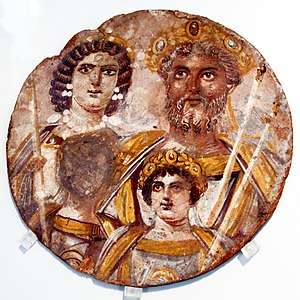 The Severan Tondo | ||
| Severan dynasty | ||
| Chronology | ||
| 193–211 | ||
|
—with Caracalla 198–211 |
||
|
—with Geta 209–211 |
||
| 211 | ||
| 211–217 | ||
|
Interlude: Macrinus 217–218 |
||
|
—with Diadumenian 217–218 |
||
| 218–222 | ||
| 222–235 | ||
| Dynasty | ||
| Severan dynasty family tree | ||
|
All biographies |
||
| Succession | ||
|
Geta was the younger son of Septimius Severus by his second wife Julia Domna. Geta was born in Rome, at a time when his father was only a provincial governor at the service of Emperor Commodus.
Conflicts between Geta and Caracalla were constant and often required the mediation of their mother. To appease his younger son, Septimius Severus gave Geta the title of Augustus in 209.
During the campaign against the Britons in the early 3rd century AD, imperial propaganda promoted the image of a happy family that shared the responsibilities of rule. Septimius Severus entrusted Julia Domna with the role of counsellor, Caracalla acted as the emperor's second in command, and administrative and bureaucratic duties were Geta's responsibility. In reality, however, the rivalry and antipathy between the brothers did not abate.
Joint Emperor
When Septimius Severus died in Eboracum in early 211, Caracalla and Geta were proclaimed joint emperors and returned to Rome. It is said that on the journey from England to Rome the two brothers kept well away from each other, not once lodging in the same house or sharing a common meal.[3]
Their joint rule was a failure. The Imperial Palace in Rome was divided into two separate sections, and neither allowed the servants of the other into his own. They only met in the presence of their mother, and with a strong military guard, being in constant fear of assassination.[4] The historian Herodian asserted that the brothers decided to split the empire in two halves, when, by the end of 211, the situation had become unbearable.[5] Caracalla tried unsuccessfully to murder Geta during the festival of Saturnalia (17 December). Finally, on the 26th of December, Caracalla had his mother arrange a peace meeting with his brother in his mother's apartments, thus depriving Geta of his bodyguards, and then had him murdered in her arms by centurions.[6]
Caracalla ordered the damnation of his memory, which was thoroughly carried out, as is clear from the archaeological record.[7][8] Reportedly, Caracalla was thereafter tormented by guilt over his deed, but sought to expiate it by adding to this crime the proscription of all his brother's former followers.[9] Cassius Dio stated that around 20,000 men and women were killed or proscribed on this charge during this time.[10]
Portrait
Very few marble portraits attributable to Geta survive to date, presumably due to the very thorough damnatio memoriae which resulted in the erasing of his images. However Roman coins with his image are plentiful, and can reflect how his father Septimius Severus and later Geta himself wanted him to be seen by the Roman people (and especially the Roman military).
Images of Geta and his older brother Caracalla cannot be well distinguished until the death of the father. Both sons were supposed to be presented as equally suitable heirs to the throne, showing thus more "depth" to the dynasty.
On his coins, Caracalla, who became Augustus in 198, was shown with a wreath of laurels, while Geta remained bareheaded until he himself became Augustus in 209.[11] Between 209 and their father's death in February 211, both brothers were shown as equally mature young men with a short full beard, ready to take over the empire. Between the death of Septimus Severus and the assassination of Geta, Caracalla's portraits did not change, while Geta was depicted with a long beard with hanging hairs, much like his father, a strong indication of Geta's efforts to be seen as the "true" successor of his father.[11]
Gallery
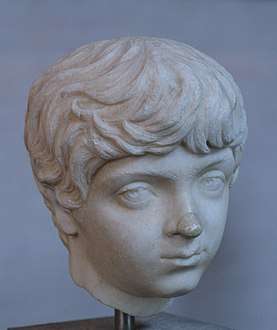 Head of young Geta at Glyptothek, Munich
Head of young Geta at Glyptothek, Munich%2C_inv._2210%2C_Roman_-_Braccio_Nuovo%2C_Museo_Chiaramonti_-_Vatican_Museums_-_DSC00897.jpg) Caracalla and Geta's mother, Julia Domna, served as their mediator during their joint reign.
Caracalla and Geta's mother, Julia Domna, served as their mediator during their joint reign.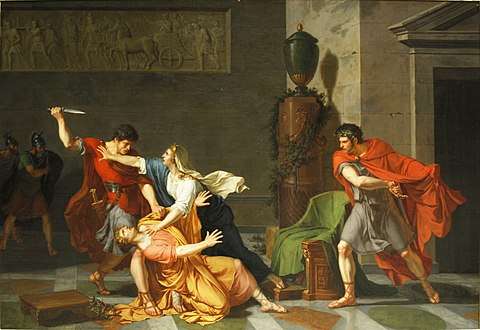 Geta Dying in his Mother's Arms by Jacques-Augustin-Catherine Pajou, Staatsgalerie, Stuttgart, Germany
Geta Dying in his Mother's Arms by Jacques-Augustin-Catherine Pajou, Staatsgalerie, Stuttgart, Germany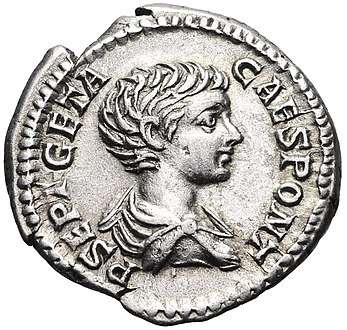 A denarius of Geta.
A denarius of Geta.
References
- Birley 1999, p. 324.
- Varner, Eric R. Mutilation and Transformation: Damnatio Memoriae and Roman Imperial Portraiture (2004) Brill Academic Publishers. p. 168
- Edward Gibbon, The Decline And Fall Of The Roman Empire, (The Modern Library, 1932), chap. VI., p. 114
- Gibbon, Ibid.
- Herodian, History of the Empire from the death of Marcus, IV., p. 144
- Gibbon, Ibid. p. 115
- Dunstan, William, E. (2011). Ancient Rome. Lanham: Rowman and Littlefield. pp. 405–406. ISBN 978-0-7425-6832-7.
- Goldsworthy, Adrian (2009). How Rome Fell: death of a superpower. New Haven: Yale University Press. pp. 70–71. ISBN 978-0-300-16426-8.
- Gibbon, Ibid.
- Cassius Dio, Roman History
- (in German) Andreas Pangerl: Porträttypen des Caracalla und des Geta auf Römischen Reichsprägungen - Definition eines neuen Caesartyps des Caracalla und eines neuen Augustustyps des Geta; Archäologisches Korrespondenzblatt des RGZM Mainz 43, 2013, 1, 99–116
Bibliography
- Dio Cassius lxxvii; Herodian iv. I.
- Birley, Anthony R. (1999) [1971]. Septimius Severus: The African Emperor. London: Routledge. ISBN 0415165911.
External links
| Wikimedia Commons has media related to Publius Septimius Geta. |
- Life of Geta (Historia Augusta at LacusCurtius: Latin text and English translation)
Geta (emperor) Born: 7 March 189 Died: 19 December 211 | ||
| Regnal titles | ||
|---|---|---|
| Preceded by Septimius Severus |
Roman Emperor 209–211 With: Septimius Severus and Caracalla |
Succeeded by Caracalla |
| Political offices | ||
| Preceded by Lucius Fabius Cilo, Marcus Annius Flavius Libo |
Consul of the Roman Empire 205 with Caracalla |
Succeeded by Marcus Nummius Umbrius Primus Senecio Albinus, Lucius Fulvius Gavius Numisius Petronius Aemilianus |
| Preceded by Lucius Annius Maximus, Gaius Septimius Severus Aper |
Consul of the Roman Empire 208 with Caracalla |
Succeeded by Lucius Aurelius Commodus Pompeianus, Quintus Hedius Lollianus Plautius Avitus |
| Legendary titles | ||
| Vacant Interregnum Title last held by Lucius |
King of Britain | Succeeded by Bassianus |